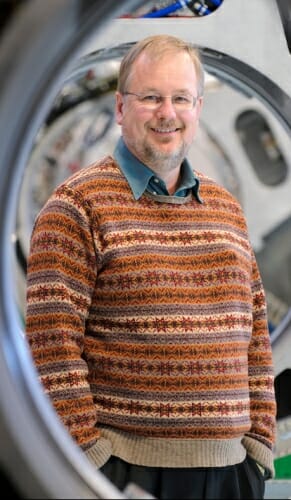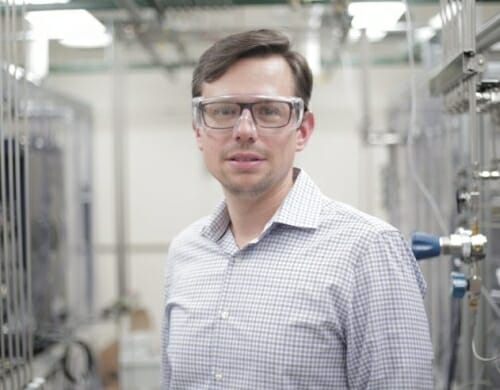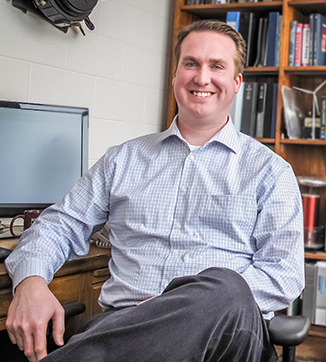New campus collaboration aims to improve support for aspiring Badger entrepreneurs
An instructor in an introductory workshop about entrepreneurship on campus asks the packed classroom, “Who here thinks of themselves as an entrepreneur?” A couple of hesitant hands go up. “Okay,” she says, “but how many of you think of yourselves as a problem solver?” All the hands in the room are now raised high.
Identifying and supporting the growing population of problem solvers with an entrepreneurial mindset on campus is one of the key goals of UW–Madison’s new Innovate Network.
Supported by campus and affiliate partners and coordinated by Discovery to Product (D2P), the Innovate Network makes it easier for faculty, staff and students with great ideas to find the resources they need to develop them and bring them to the marketplace.
“As a campus, we have been hearing for some time now that there is a need for centralized information and a clear starting place for aspiring campus entrepreneurs,” says UW–Madison Chancellor Rebecca Blank. “D2P’s efforts to bring partners together through the Innovate Network and website helps UW–Madison better meet that need and provide a framework for stronger collaboration among partners in the entrepreneurial ecosystem.”
While UW–Madison has a wealth of resources available to support the development of ideas with commercial potential, programs and centers are relatively decentralized, so it can be hard to know where to start.
“Innovate facilitates creative collaborations across multiple fields of research by providing a visible starting point and easy-to-navigate portal to access the wide network of support on campus for innovation,” says Interim Vice Chancellor for Research and Graduate Education Norman Drinkwater. “We appreciate this joint effort by campus Innovate Network partners to provide expert advice on everything from targeted funding to marketplace research for the entrepreneurs of today, and additional resources for those who are just beginning their journey and have yet to fully realize their dream inventions.”
Problem solving, innovation, and supporting Wisconsin’s economy have long been part of the university’s DNA. Bill Barker, the associate dean for research in the College of Agricultural and Life Sciences (CALS) recounts the story: “UW–Madison was the source and wellspring of academic technology transfer in the United States. The Wisconsin Alumni Research Foundation (WARF) was the first to patent a university invention which had come out of the CALS department of agricultural chemistry, now biochemistry.
“From there, WARF became an entity that generated resources to support the mission of the institution and seed more research, which is genius, when you think about it,” Barker says. “As a component of tech transfer, I think of entrepreneurship as one of the mechanisms whereby research escapes the pages of the journal and gets out to do good in the world.”
Innovation and entrepreneurship are often perceived to be associated solely with business and technology transfer, but great ideas can come from a wide range of contexts. “You wouldn’t expect a successful startup out of the soil science department perhaps, but we have one,” says Barker. “Or animal science, but there are several. Biochemistry is more obvious, but regardless — the things that people work on in CALS, whether they’re basic or applied — they’re working on real problems and living the Wisconsin Idea.”
Ive Hermans is a professor of chemistry and biochemical engineering in the College of Letters & Science. Recently recognized for his lab’s research on developing chemical processes that produce fuels and fibers in a more sustainable way, Hermans reinforces this notion, pointing to the Center for Healthy Minds in the social sciences and the Wonder Walk virtual reality app in the arts and humanities as just two examples of projects out of Letters & Science applying university breakthroughs to spin out projects that better society. “The Innovate Network provides the resources and connections to help researchers translate their exciting discoveries into an impressive range of real-world applications,” Hermans says.
One of the newest partners in the Innovate Network is the Isthmus Project, an initiative from UW Health and the UW–Madison School of Medicine and Public Health to support health system innovators. Emeritus faculty and successful campus entrepreneur Rock Mackie leads the effort from the UW Health side, collaborating with Kurt Zimmerman, director of industry engagement for the school.

Thomas “Rock” Mackie Photo: Jeff Miller
Speaking about the intersection between the Isthmus Project and the Innovate Network, Mackie says, “A campuswide support system is critical, and the Innovate Network is cataloging and connecting our many resources to make it easier for innovators from any discipline to understand and access both specialized and general support for entrepreneurs.”
Where the Isthmus Project is a hub for health system innovators, the student organization Transcend UW serves a similar role for the student body, hosting one of the country’s largest student-run innovation competitions each April. Transcend Vice President Tanner Dahlhauser agrees that a meta-hub of sorts has real value.
“There’s no collection of these different doorways — nowhere that I can go if something has piqued my interest in entrepreneurship but I don’t know what to do with it next,” Dahlhauser says. “Having a place where you can find all those doorways is huge. I think it’s going to be fundamental in changing the way UW–Madison treats entrepreneurship and the UW–Madison student body treats entrepreneurship as well.”
Professor of electrical and computer engineering Dan Ludois reflects on his experience founding C Motive after finishing his PhD. The startup got a generous boost provided by prize money from various programs and competitions on campus. But more support was needed to develop their electrostatic motor.
“For hardware-based things, particularly energy-based things, there’s such a slow burn and slow to get it going, because they’re such a fundamental technology,” Ludois says. “In hindsight, what we and companies like us should have had available to us is what I call the third space, where you incubate the idea that was academic into something that’s more real before you turn it into an actual company.
“Thankfully, we turned the corner in our fundraising but if the Innovate Network can help cultivate that third space mentality and encourage people to work on things before starting a company, it will really help.”
“Entrepreneurs are positive thinkers, they have a lot of energy and enthusiasm for what they’re trying to do,” says Anne Smith of the Law and Entrepreneurship Clinic. “There is a lot of interest in entrepreneurship on campus, and it comes at all levels. It’s people working for the university, it’s students, it’s faculty. It’s all over.
“It’s a changing paradigm that entrepreneurship can be as valuable as academic research to society. I think that’s been a struggle, and I think there’s been a lot of progress. The more that we can make space for entrepreneurship and commercial endeavors to thrive alongside writing and academic endeavors, the easier it becomes for people to pursue their ideas.”
Partners in the Innovate Network have been discussing ways to do just that. Over the past year, D2P has been working closely with those in UW–Madison’s entrepreneurial ecosystem to shape content and strategy for the new site and chart a course for future collaborations.
“A key part of D2P’s mission is to serve as the “front door” to UW–Madison’s entrepreneurial ecosystem, so we’re really pleased to coordinate this effort that helps connect faculty, staff, students and alumni with the right resources at the right time,” says D2P Director Andy Richards. “Innovate is a website, but it is also a network of partners working together to advance a common goal of better supporting campus innovators. It’s the strength of these partners working together that makes this such an exciting project for all involved.”








